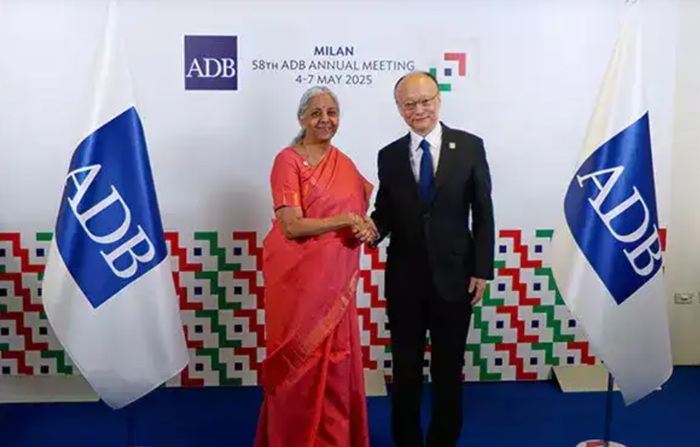
India opposed a move by the Asian Development Bank (ADB) to grant a $800 million loan to Pakistan citing evidence of Islamabad diverting development funds for military use, and cautioned the bank about impending credit risks, two officials familiar with the matter said.
India shared deep concerns regarding the potential misuse of ADB resources, particularly in light of Pakistan’s increasing defence expenditure, its declining tax-to-GDP ratio, and the lack of demonstrable progress on key macroeconomic reforms, they added, requesting anonymity.
India’s strong opposition to ADB’s financial aid to Pakistan came almost a month after New Delhi protested the International Monetary Fund’s decision to provide a $2.3 billion bailout package to Islamabad, which saw IMF imposing about a dozen stringent conditions attached with the credit facility, making diversion of funds almost impossible.
The IMF loan to Pakistan came in the midst of Operation Sindoor, India’s direct military response to the April 22 terror strike at Pahalgam in Kashmir that killed 26 civilians in what was the worst attack on civilians since the 26/11 Mumbai strikes.
India launched the operation in the early hours of May 7, bombing nine terror camps in Pakistan and Pakistan-occupied Kashmir (PoK). The pre-dawn strikes — which killed at least 100 terrorists — sparked four days of strikes and counterstrikes with fighter jets, missiles, drones, long-range weapons and heavy artillery. Between the launch of the operation in the early hours of May 7 and the ceasefire on the evening of May 10, Indian forces bombed nine terror camps in Pakistan and Pakistan-occupied Kashmir, and the IAF struck targets at 13 Pakistani air bases and military installations.
According to a PTI report from Islamabad on Tuesday, ADB approved a $800 million loan to Pakistan for strengthening its fiscal sustainability and improving its public financial management. The credit package included a $300 million policy-based loan (PBL) and a $500 million programme-based guarantee (PBG), the report said.
Reacting to this, New Delhi “vehemently” opposed the move and shared deep concerns regarding the potential misuse of ADB resources, the officials cited above said.
The linkage between Pakistan’s increase in expenditure on its military, as opposed to on development, cannot be fully explained solely in terms of its domestic resource mobilization, they said.
India highlighted that Pakistan’s tax collection as a share of GDP declined from 13% in FY18 to 9.2% in FY23 and continues to remain way lower than the Asia and Pacific average of about 19%. However, there has been a significant increase in defence spending in the same period. This points to the possibility of diversion of funds made available to the country by external agencies, the officials explained.
“India expects the ADB management to adequately ring-fence the ADB financing, to prevent any such misuse,” one of them said. New Delhi questioned the management’s argument that improvements were noticed in certain areas of reforms in Pakistan, and said that had the previous programs, funded both from ADB and the IMF, succeeded in putting in place a sound macroeconomic policy environment, the country would not have approached the IMF for the 24th bail-out program, this person added.
“Such a track record calls into question both the effectiveness of the program designs, their monitoring and their implementation by the authorities,” he said. Pakistan’s poor track record of implementation stems from the military’s deeply entrenched interference in economic affairs, posing risks of policy slippages and reversal of reforms as has been witnessed in the past, he added.
Even when a civilian government is in power now, the army continues to play an outsized role in domestic politics and extends its tentacles deep into the economy. The situation has not changed for the better; rather the Pakistan Army now plays a leading role in the Special Investment Facilitation Council of Pakistan, he said.
“In fact, India expressed strong reservations about Pakistan’s existing governance system, which poses a continuing severe threat to regional peace and security. The country’s policy of cross-border terrorism has led to a worsening of the security situation in the region and has significantly escalated macroeconomic risks for Pakistan, which also heightens the enterprise risks for the ADB.”
India expects the ADB to closely monitor the implementation of the policy matrix to achieve the intended outcomes, this official said.
Pakistan’s continued reliance on external debt raises concerns about the long-term sustainability of future exposures, especially in view of the high debt-to-GDP ratio and poor credit rating of the country, he added. (Hindustan Times)
